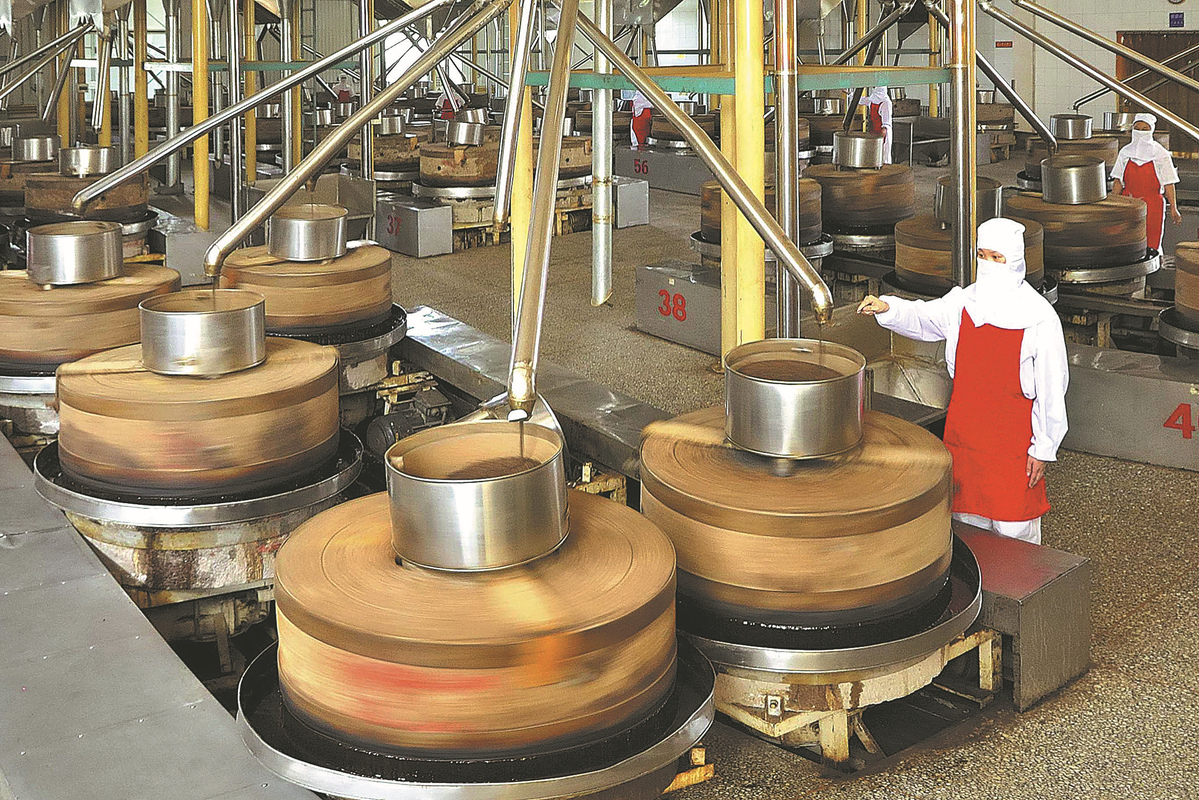Time-honored brands adopt innovation

Time-honored brands in China are stepping up innovation and adopting new technologies to win more global market share, often by upgrading techniques nurtured over decades.
One week after Shandong province-based Ruifu Sesame Oil Co Ltd signed a contract with Poke House Inc to supply sesame oil to the fast-casual restaurant chain headquartered in Los Angeles, the company delivered a container of the same to its client in mid-November.
The Chinese sesame oil producer will supply sesame oil products worth $1.5 million to the restaurant chain in the next year, according to the contract inked at a promotion of Shandong-based time-honored brands held during the sixth China International Import Expo in Shanghai on Nov 6.
"We have upgraded the production techniques by using integrated and automated facilities, which enable us to maintain the nutrition of sesame seeds as much as possible and produce oil that meets international food standards," said Chen Xinghai, director of the planning department of Ruifu.
National-level time-honored brands refer to those that have been developing for over five decades.
Upgraded techniques
With a technique of stone mill-ground sesame oil passed down over 600 years, Cuizi brand sesame oil, Ruifu's main product, has been listed in the first batch of national-level time-honored brands in China.
Hundreds of years ago, the workshop used techniques, including stone mill and aqueous extraction that involves water as a medium to extract the oil from seeds to produce sesame oil.
The company has optimized the production process — based on the traditional techniques — to increase the content of physiologically active components of sesame oil such as vitamin E by 10 to 20 percent, said Chen.
The sesame oil and paste products produced by the company have been sold to more than 30 countries and regions, including Japan, South Korea, Australia, France, Canada and Ethiopia.
Like Ruifu, time-honored companies in China are making efforts to innovate their techniques so as to produce diverse products that meet current market demand.
China listed the cultivation and development of time-honored Chinese brands and traditional cultural brands in the Outline of the Strategy for Expanding Domestic Demand (2022-35) released by the State Council, the country's Cabinet, last year to promote their development.
Guided by central government policies, local governments have released a series of methods to boost the protection and development of time-honored brands.
The national-level and provincial-level time-honored brands in Shandong generated a total revenue of 232 billion yuan ($32.47 billion) last year, a year-on-year increase of 5.9 percent.
Smart pharmacy
After seeing a doctor at Jinan Hospital of Traditional Chinese Medicine and getting a prescription, 50-something Yang — who chose to reveal only her family name — was told she could leave and that the medicine would be delivered to her.
Yang, who was suffering from insomnia for several days, previously needed to wait for about half a day at the hospital to get the medicine, but this time, she did not have to because of the smart TCM pharmacy, a system that Shandong has been developing to make TCM benefit more people.
Once patients receive their prescriptions at medical institutions, they can choose a smart TCM pharmacy and make payments. The prescription is then transferred through the TCM data platform to the designated pharmacy, which offers personalized medicine preparation and home delivery services.
There are 48 smart TCM pharmacies in the province, according to the Shandong Provincial Administration of Traditional Chinese Medicine.
Yang chose the smart TCM pharmacy of Shandong Hongjitang Pharmaceutical Co Ltd, a venerable Chinese pharmaceutical enterprise with a history of 116 years, for her medicine.
Hongjitang, one of the first batch of Chinese time-honored brands, has employed technologies including the internet of things and blockchain to establish the first automated line of smart TCM pharmacy in China.
"Eighty-five percent of the work in the smart pharmacy can be done by the automated facilities," said Liu Tao, chairman of Hongjitang.
Behind its transformation from a traditional pharmaceutical manufacturing company to a tech-leading and innovation-driven enterprise is the support of the financing sector. The local government has been developing a financing chain that focuses on boosting innovation and technology in the province.
When Hongjitang turned to innovation, Lucion Group, a State-owned company, injected capital to help it build an integrated smart TCM facility and expand markets.
"The financing support has provided confidence for us to explore broader aspects, including drug research and development, development of TCM formulas, and construction of a comprehensive TCM evaluation system," said Liu.

